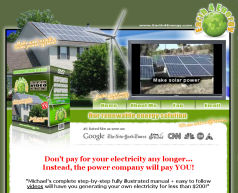|
|
|
Close Help | ||||||||||||||
|
|
WindSolarEnergy.ORG Advice for
Achieving |
| |
|
|
|
|||||||||||||||||||||||||||||||||||||||||||||||||||||||||||||||||||||||||
|
Windmills have been in use for centuries, with the first windmill believed to used in Persia in the 9th century CE.
Windmills are machines that convert kinetic energy (from the wind) to mechanical energy. Anything that can produce rotational power can be useful for a variety of purposes. Today, electric motors and combustion engines are usually implemented whenever there is a need to rotational power.
Windmills are still in use today, with various farms throughout the world using windmills to pump water in remote locations where electricity is unavailable (see photo on the right). Windmills that pump water are called windpumps.Windpumps can pump water out of the ground, or pump standing water into a pond or other more suitable location. With a 15 to 20 MPH wind, 6' windmills can pump 180 gallons of water per hour (3 gallons per minute), depending on the depth of the well. The maintenance on these windpumps is minimal, requiring a simple lubrication or gear oil change once or twice a year. Some windpumps can pump water from wells as deep as 600 feet. Windpumps were also used to supply water for steam powered locomotives.
Another common usage for windmills are grinding grain. These were very popular in Europe, especially from the 12th century until the steam power age.
Various improvements in design included the ability for the windmill to turn and face the wind, various braking mechanisms to keep the mill from turning too fast, increases in the number of millstones available for use, increases in height, and improvements in building materials to make the mills more durable.
The millwrights were very skilled craftsmen and produced a number of beautiful designs. A number of mills have been restored due to their photogenic properties. The trend for organic and green powered manufacturing methods have resulted in a slight increase in desirability.
Windmills have also been implemented in sawmill operations, and the threshing of grains. Wherever a need may be for a standing structure to provide rotational power, a windmill can be used to harness the wind's energy. The possibilities are many.
Of course, the disadvantage of windmills is the intermittent nature of wind. Some areas of the world are simply not very windy, so windmills were not a feasible solution in those cases. A person's productivity was also wholly dependant on the weather conditions each day. For this reason, electrical and steam power technologies eventually replaced windmill operations.
For homeowners who want a renewable energy source and desire to no longer rely on air polluting utility companies for their energy needs, the windmill alternatives are many and can have a variety of uses.
Coming soon: Sign up for our free six part
mini-course on how to properly plan for adding solar and wind energy to your
home.
![]() Bookmark
With del.icio.us
Bookmark
With del.icio.us ![]() Digg
this story
Digg
this story ![]() Submit
to StumbleUpon
Submit
to StumbleUpon
Top Do It Yourself Guides - Purchased and reviewed
| Number one | Number two | Number three |
 |
 |
 |
| Earth4Energy | Home Made Energy | Home Made Power Plan |
| Click here to
visit Earth4Energy |
Click here to
visit Home Made Energy |
Click here to
visit Home Made Power Plan |
| Full Review | Full Review | Full Review |
WindSolarEnergy.ORG
is a free resource offering advice on achieving renewable energy
independence
On the site you will find valuable articles covering how wind energy is
harnessed through wind turbines, how solar energy is harnessed through
photovoltaic solar panels, best locations for Wind Power and much more.
You will also find helpful reviews of Do it Yourself guides that we have
purchased and researched.
If you found this site useful, spread the word and help others find WindSolarEnergy.ORG
by adding us to your favorite social bookmarking site:
![]() Bookmark
With del.icio.us
Bookmark
With del.icio.us ![]() Digg
this story
Digg
this story ![]() Submit
to StumbleUpon
Submit
to StumbleUpon
All rights
reserved. Copyright © WindSolarEnergy.ORG 2008-2009
Privacy
Policy